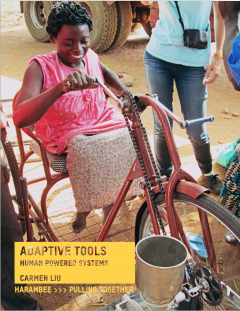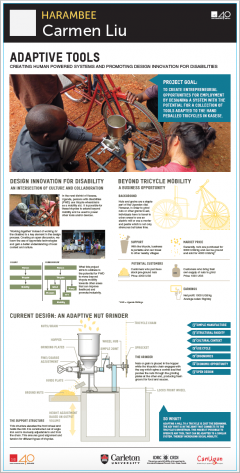Fourth-year student Carmen Liu’s capstone project was focused on the possibility of taking something that people with disabilities in the region already owned and used—the wheelchair tricycle—and designing adaptations so that the tricycles could be used to power tools or other devices. The thinking behind this project was that while the tricycle already allowed for increased mobility, perhaps it could also be used as a tool that could offer its user economic empowerment, too. The challenge was designing something that could be manufactured locally with the materials available, and that suited the local context and needs of the users.
Carmen’s ultimate design was an attachment to the tricycle that would allow the user to power a collection of tools using the hand power of the tricycle. To illustrate the concept, Carmen designed a small-scale mill that could be used for grinding nuts and grains—a staple part of Ugandans’ diet. Carmen settled on designing a small-scale mill because she saw an opportunity in the local market. In order to grind nuts and grains, locals would have to travel to urban areas where electric mills operated, or grind them by hand with a mortar and pestle; a time consuming and laborious task.
While the mill offered one opportunity for the economic empowerment of those with disabilities, Carmen’s ultimate accomplishment with this project was the design of a joint that connects to the tricycle’s drivetrain. This joint meant that the tricycle could be used to power a variety of attachable tools, thereby ensuring that there were a variety of entrepreneurial economic options available to users.

